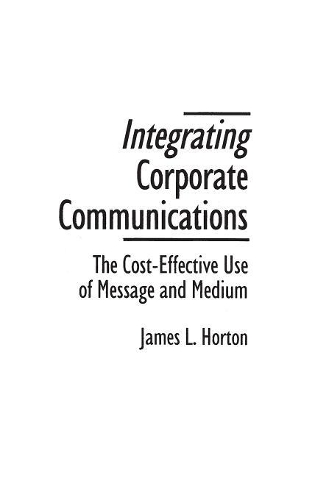
Integrating Corporate Communications: The Cost-Effective Use of Message and Medium
(Hardback)
Publishing Details
Integrating Corporate Communications: The Cost-Effective Use of Message and Medium
By (Author) James L. Horton
Bloomsbury Publishing PLC
Praeger Publishers Inc
30th September 1995
United States
Classifications
Tertiary Education
Non Fiction
Communication studies
658.45
Physical Properties
Hardback
336
Width 156mm, Height 235mm
624g
Description
Seldom does a work on corporate communications take such a radical economic approach to the topic. Horton integrates corporate communications cost-effectively into all business activity and presents a new way to look at corporate communications as a force behind all business disciplines. He describes and reviews external and internal communication; examines human behavior in communicating; reviews corporate communication structure; and analyzes messages and media and shows how to get started toward cost-effective corporate communication. In 11 chapters, the book presents a look at corporate communications based on economic principles. Separate chapters examine the business environment and communication; corporate communication and strategy and reputation; corporate communication and the individual; corporate communication and messages; corporate communication and media; corporate communication and measurement; and corporate communication and business structure. A major resource for senior managers, strategists, and other communications specialists.
Reviews
Seldom does a work on corporate communication take such a radical economic approach to the topic...Horton demonstrates that all corporate activity is dependent on communication, from raw materials to the delivery of finished goods and services. His view, increasingly shared by others outside of the communication field, is that corporate communication is not only a principle tool of management, but also central to the creation of wealth in any economic system. Recommended for all public, academic, and professional collections.-Choice
"Seldom does a work on corporate communication take such a radical economic approach to the topic...Horton demonstrates that all corporate activity is dependent on communication, from raw materials to the delivery of finished goods and services. His view, increasingly shared by others outside of the communication field, is that corporate communication is not only a principle tool of management, but also central to the creation of wealth in any economic system. Recommended for all public, academic, and professional collections."-Choice
Author Bio
JAMES L. HORTON is general manager in charge of the public relations unit of Poppe Tyson, a nationwide integrated communications firm. He has extensive management and other experience in investor relations, corporate communications, marketing, and communications consulting. Among his clients are financial services firms, computer and high-tech companies, a German auto manufacturer, oil, chemical, and environmental treatment firms, consumer packaged goods manufacturers, basic manufacturers and utilities. Horton writes and lectures frequently on business management practices and quality in corporate communications. Horton holds a Masters in marketing and finance from the J.L. Kellogg School of Management, Northwestern University M.A. from the University of Missouri School of Journalism and a M.A. from U.C.L.A., in English literature.
